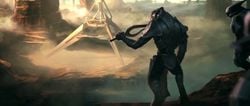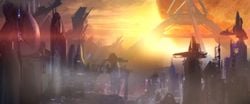War of Beginnings
From Halopedia, the Halo wiki
Template:Newcontent Template:Battle Infobox
- "So full of hate were our eyes that none of us could see.
Our war would yield countless dead, but never victory." - — Covenant Writ of Union
The San'Shyuum-Sangheili War[1] was an interstellar war set between the Sangheili and the San'Shyuum races, over religious and technological differences. At the conclusion of the war, the Writ of Union was penned and initiated, and the Covenant was kindled.[2]
History
Prelude

After leaving their homeworld Janjur Qom in 2100 BCE, the San'Shyuum encountered the Sangheili in 938 BCE, who also had experience with Forerunner technology. First contact between the two species occurred in a Sangheili-colonized system on a world that contained Forerunner artifacts. The San'Shyuum believed that incorporating Forerunner technology was allowed by their religion. To the Sangheili, such a thing would have been unthinkable heresy.[3] The San'Shyuum attempted diplomacy with the Sangheili; they sent a delegation to the Sangheili frontier world of Ulgethon to explain that they, too, worshiped the Forerunners. The Sangheili summarily executed the delegation, thus beginning the hostilities.[4][5]
War
During the combat, the Sangheili had an early advantage, with each warrior comparable in skill to several San'Shyuum in battle. However, the San'Shyuum's technological superiority, and possession of the Forerunner Dreadnought, meant that they had the advantage in space battles, using the Dreadnought to great effect in devastating hit-and-run strikes against the Sangheili war fleets. Eventually in 876 BCE, in order to ensure the survival of their race, the Sangheili were forced to amend their position of the treatment of Forerunner technologies and began studying their relics and incorporating elements into their warship, weapon and armor designs.[6] The San'Shyuum also realized that if there were other races with martial capabilities like the Sangheili, they would be in serious danger.[2]
The war eventually led to a skirmish on the Planet of Blue and Red in 860 BCE. The planet's location made it of strategic importance to the Sangheili, however the San'Shyuum desired to take control of the world for the numerous Forerunner artifacts located on and underneath the planet's surface.[7] The San'Shyuum forces were led by Mken 'Scre'ah'ben, High Lord of Sacred Relics, while the Sangheili forces were led by Ussa 'Xellus. Although the San'Shyuum were vastly outnumbered,[8] they used Aggressor Sentinels to weaken Sangheili forces while scientists uncovered and examined the Forerunner structures. Eventually, the San'Shyuum's command stations were breached by Sangheili assassins—forcing all San'Shyuum on the planet to retreat to orbit. High Lord Mken had ordered the Forerunner Dreadnought to fire upon the Sangheili forces, but under Ussa's command, most of them had escaped into a Forerunner structure, which the San'Shyuum were unwilling to damage.[9] The Sangheili on the planet were eventually forced to flee the system.[10]
The war was eventually brought to the Sangheili homeworld, Sanghelios. The San'Shyuum and the Sangheili both fought for possession of the numerous Forerunner artifacts on the planet.[11]
The Writ of Union
- "So let us cast arms aside, and like discard our wrath.
Thou, in faith, will keep us safe, whilst we find the Path." - — Covenant Writ of Union
In time, the Sangheili learned of the San'Shyuum's belief in the Great Journey, where the Forerunners used the Halo Array to ascend to a god-like state, and wished to repeat this process on themselves. Coupled with this belief and the fact that the cause of war was obsolete, the Sangheili agreed to unite with the San'Shyuum into an alliance to avoid mutual extinction. In 852 BCE, the two races signed a treaty known as the Writ of Union to form the early Covenant, which defined the two races' positions: the San'Shyuum would act as the religious leaders, studying the Forerunners' technology and seeking out the Halos, while the Sangheili would serve as their protectors, using weapons and technology developed by the San'Shyuum. The Dreadnought was decommissioned and made the center point and power source of High Charity, a mobile planetoid which would serve as the capital of the Covenant.
Aftermath
Ussa 'Xellus' insurgency
While most Sangheili willingly—or begrudgingly—joined the new Covenant, there were those who resented what they viewed as submission to the San'Shyuum. The Covenant sought to make an example of these dissenters, silencing those who rejected the new union with overwhelming force. The resistance movement would come to be led by the Sangheili Ussa 'Xellus, a skilled strategist and veteran of the war. After the Xellus keep was attacked by a Covenant air raid, the civil war expanded across Sanghelios. Because of their inferior numbers 'Xellus and his followers were soon driven into hiding in the desolate region of Nwari. However, 'Xellus would travel across Sangheili colonies, looking for dissidents he could recruit to his cause. After the like-minded elder Sangheili 'Crecka showed him Shield World 0673, 'Xellus intended to make the Forerunner world his new base of operations and home for his people. Ussa and his followers soon left the Nwari region as Covenant assassins closed in on their location.[10]
List of appearances
- Halo: Contact Harvest (First mentioned)
- Halo: The Cole Protocol (Mentioned only)
- Halo: Broken Circle (First appearance)
- Halo 2 Anniversary
Sources
- ^ Halo: Broken Circle, page 1
- ^ a b Halo: Contact Harvest, page 147
- ^ Halo: The Cole Protocol, page 350
- ^ Halo: Broken Circle, page 4
- ^ Halo 2 Anniversary, Terminals
- ^ Cite error: Invalid
<ref>tag; no text was provided for refs namedEncyclopedia - ^ Halo: Broken Circle, pages 1-3
- ^ Halo: Broken Circle, pages 6-7
- ^ Halo: Broken Circle, pages 9-13
- ^ a b Halo: Broken Circle, Chapter 1
- ^ Halo Encyclopedia, page 120 (2011 edition)

